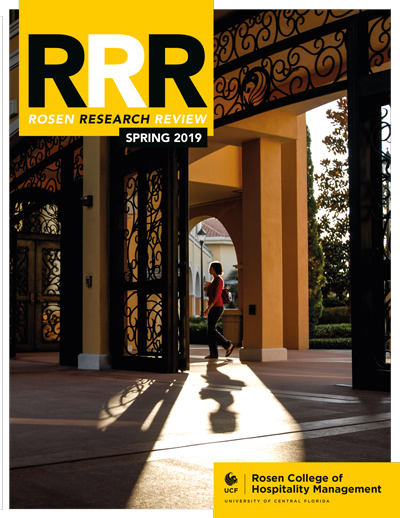Rosen Research Review: What Makes Them Share
 Generation Y, Electronic Word of Mouth and Brand Success
Generation Y, Electronic Word of Mouth and Brand Success
Generation Y has redefined the way customers seek, share and consider information about products and services before purchasing. Proficient users of digital technologies and social media, members of Generation Y are quick to share their experiences with brands and companies and their opinions have a significant influence on brand revenue and reputation. Dr. Tingting (Christina) Zhang from Rosen College of Hospitality Management and collaborators Dr. Behzad Abounia Omran (Ohio State University) and Dr. Cihan Cobanoglu (University of South Florida Sarasota-Manatee) examined what influences Gen Y’s decision to participate in electronic word of mouth (eWOM).
Social media and digital technologies are key to information exchange, especially among people born after 1981. The so-called Generation Y – a cohort defined here as born between 1981 and 1994 – has spent their entire lives using digital technologies and, in many ways, has redefined how marketing information is shared and consumed. Customer-generated content in the form of product or service reviews posted on platforms such as Facebook or TripAdvisor is now often the defining factor considered by prospective customers prior to purchasing.
Technology experts and stakeholders project that Generation Y will continue to be liberal in their information disclosure and sharing as they go up the career ladder and mature in their personal lives. As their spending power increases, knowing how they engage in electronic word of mouth (eWOM) is crucial for brand revenue. Dr. Tingting (Christina) Zhang (Rosen College), Dr. Behzad Abounia Omran (Ohio State) and Dr. Cihan Cobanoglu (University of South Florida) set out to explore what makes members of Generation Y most likely to share in their 2017 study published in International Journal of Contemporary Hospitality Management.
Photo: View Apart/Shutterstock.com
GEN Y – WHO?
In the hospitality sector, Generation Y currently represents a priority market segment. Between 24 and 35 years of age (at the time the article went to press), in most developed countries, members of Generation Y eat out twice as often as the remaining part of the population and they’re anticipated to become significant spenders within the lodging industry.
Proficient users of social media, members of Generation Y use digital technologies to stay connected with family and friends and, overall, they’re positive about the influence of technology on their lifestyle whether at home, work or leisure. Overall, they’re more susceptible to peer influence through social media than they are to brand marketing. It is therefore important to understand what motivates them to share positive and negative experiences about products and services as these reviews can determine brand survival, especially in case of service failures.
WHEN SERVICES FAIL
Service failures – situations when customers are dissatisfied with the service they’ve received – cannot be avoided, but must be handled appropriately to prevent loss of patronage. Many industry managers have implemented service failure recovery strategies, which are especially important in sectors that rely on repeat purchases, like beverage establishments. It’s a well- documented phenomenon that unhappy customers tend to inform their friends and family, but also acquaintances and even strangers, if they’ve had a particularly negative experience. This can damage brand reputation, revenue and even employee morale, which is why it’s important to understand how recovery packages influence eWOM.
ELECTRONIC WORD OF MOUTH
Electronic word of mouth – eWOM – is an effective marketing strategy appealing because of its ability to overcome customer resistance, lower costs and deliver quickly, especially through social media and mobile technologies. It allows customers to share their views online and to favor or go against specific products. eWOM includes all informal communication between customers about features of products and brands, and comparisons of lived experiences to promises made in mass media campaigns. Companies that create bespoke platforms for customer interaction are generally seen favourably and tend to enhance customer experience and engagement.
Nevertheless, as eWOM spreads rapidly and can be negative or positive, it can influence customers to a considerable degree and be difficult to counteract. It is especially difficult to counteract by companies themselves, as customers tend to trust each other more than they trust brands.
As technology has become the “third hand” or “second brain” to many members of Generation Y, who use email, text and social media daily through their smartphones, they have unprecedented impact on a product’s or service’s success. The study by Zhang, Omran and Cobanoglu sheds light on some factors that influence Generation Y’s likelihood to share positive or negative service experiences through eWOM.
SURVEY DETAILS
An electronic, self-administered survey was distributed to a convenience sample of 21–35-year-olds representative of the demographic. The sample was randomly divided into three groups and each presented with a specific scenario. The group was then asked to keep this scenario in mind as they answered questions about engaging in eWOM. Scenarios included a positive and a negative experience at a restaurant, as well as a negative experience followed by successful delivery of a failed service recovery package. Participants were also asked to rate their self- assessed technological abilities and to score the influence their peer group and their family members had on their eWOM behaviours.
A total of 600 members of Generation Y took part in the survey and 583 sets of responses were included in the final analysis. There were slightly more females than males (53:47%) in the sample and the average age of respondents was 25. Although most respondents achieved advanced levels of education (beyond high school), they represented a range of jobs and professions from low- to high-skilled. The number of participants assigned to each scenario was approximately the same. Factors examined as influences included whether someone was an active user of social media (AUSM), whether they were tech savvy (TSMT), and the level of family as well as peer influence.
WHEN THEY SHARE
The results showed that Generation Y members who are AUSM were equally likely to engage in eWOM regardless of whether their experience was positive or negative. Peer influence made a difference when considering sharing positive experiences and it was a significant determinant of sharing negative experiences. Younger (21–24) but not older (25–35) cohort members were influenced by their family when deciding whether or not to share a positive experience. Family members also had a significant influence on the younger cohort when deciding about sharing negative experiences. When service failures occurred and were followed by satisfactory recovery packages, Generation Y members seemed motivated to share their experience through eWOM.
The results of this study suggest that whether an experience is positive or negative has no real impact on the likelihood of Generation Y members sharing their opinion through eWOM. Well-educated Generation Y consumers in most developed countries engage actively in discussing their daily lives through digital platforms, especially if they’re technologically sophisticated. The influence of family on the likelihood of engagement with eWOM remains unclear as the results were mixed with family holding a greater sway over the younger members of Generation Y. It is likely that cultural background and family values impact the decision to engage in eWOM, particularly among the younger cohort more likely to still live with their parents. At the same time, peers appeared to have a sweeping influence on motivating Generation Y consumers to engage in eWOM.
ACTIONS FOR INDUSTRY MANAGERS
Generation Y plays a growing role in the global economy, but how brands can best engage with them is still being explored. Understanding how technology is used to absorb and transmit information is important, especially since the behaviours of Generation Y are likely to have the most significant influence on market behaviours in the future. More research is needed, but as we wait for further insights, some practical strategies emerge to be implemented right away.
First, managers in the industry should learn to use online reviews. In platform design, they should consider strategies that encourage sharing of positive experiences. In addition, managers could also look for solutions that use key influencers (family and peers) to mediate the kind of reviews that get posted Marketers must also become more digitally savvy if they want to encourage positive reviews of successful failed service recovery packages. Even if recovery packages are well received, they’re less likely to be shared than opinions of the negative experience at initial service failure. As such, companies need to develop bespoke ways of dealing with complaints. Importantly, the hospitality industry must use social media as part of their marketing strategy, including creating specific fan pages and developing apps that allow their young customers to connect and exchange opinions and comments.
 Dr. Tingting (Christina) Zhang is an assistant professor at Rosen College of Hospitality Management, University of Central Florida, FL. U.S.A. Her research interests include co-creation, social media marketing, mobile technology, smart technology, and customer engagement. Dr. Zhang holds a Ph.D. and master’s degrees in Consumer Sciences from the Ohio State University, OH. U.S.A. and a bachelor’s degree in Tourism Marketing from Beijing International Studies University, Beijing, China.
Dr. Tingting (Christina) Zhang is an assistant professor at Rosen College of Hospitality Management, University of Central Florida, FL. U.S.A. Her research interests include co-creation, social media marketing, mobile technology, smart technology, and customer engagement. Dr. Zhang holds a Ph.D. and master’s degrees in Consumer Sciences from the Ohio State University, OH. U.S.A. and a bachelor’s degree in Tourism Marketing from Beijing International Studies University, Beijing, China.
A: 9907 Universal Blvd. Orlando, FL 32819
E: tingting.zhang@ucf.edu T: +1 (407) 903 8195
W: https://hospitality.ucf.edu/person/tingting-zhang/
Researchers in Focus
Research Objectives
This research examines the implications for the hospitality industry of Generation Y’s use of social media to share positive and negative experiences.
References
Zhang T, Omran BA, Cobanoglu C. Generation Y’s positive and negative eWOM: use of social media and mobile technology. (2017). International Journal of Contemporary Hospitality Management. 29(2):732-762.
Personal Response
What is the best way a brand can deal with a complaint to ensure that a positive experience of a failed service recovery package is shared as quickly and as powerfully as the original negative experience?
The proliferation of peer influence through the social networking platforms/ communities is the top solution for a brand to promote the positive electronic word of mouth when processing a complaint followed by a happy recovery experience. Second consideration should be the smart leverage of social media and mobile technologies. Active engagement with customers over social media and mobile technologies makes customers feel empowered and thus establishes a positive brand image.
What first inspired your work in this area?
I started this field of research when I began my Ph.D. studies at The Ohio State University in 2013. As a member of Generation Y cohort, I have observed and experienced the massive obsessions of social media usage and mobile technologies at work and life. This is a valuable progress of times when people become more empowered by virtual technologies and online communities, and thus have a powerful voice as consumers. This is a crucial opportunity for companies to engage with and obtain active loyalty from their target customers if they wisely leverage the transformational tools and trends.




